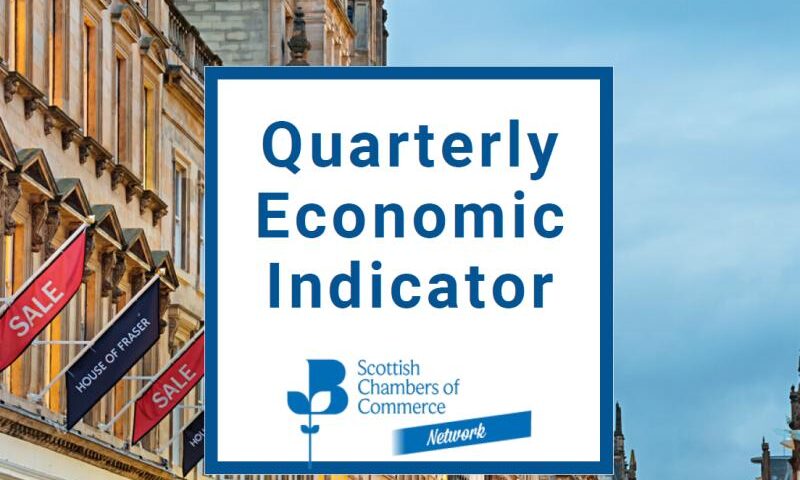High Interest Rates Preventing Investment In Scottish Economy

100 Days To Go To Self Assessment Deadline
23/10/2023
Workers On Voluntary Real Living Wage To Receive 10% Pay Rise
24/10/2023High Interest Rates Preventing Investment In Scottish Economy

- INTEREST RATES FEAR RISING: Concern over interest rates has seen a significant increase over the quarter, rising from 37% of firms in the last quarter to half of firms, which is a five-year survey high.
- INFLATIONARY CONCERNS EASING: Concern over inflation remains high among all firms but has eased generally over the quarter down to 70% from 75% in the last quarter.
- PRICE RISES EASING SLIGHTLY: Fewer firms are indicating that they will raise prices this quarter compared to last, with just under half of firms (48%) saying they will raise prices compared to 55% last quarter.
- INVESTMENT FLATLINING: While more firms continue to report rises in investment than falls on balance, over half (55%) have reported no changes to total investment, which is a five-year survey high.
- TRAINING INVESTMENT ALSO FLATLINING: Over half of firms (57%) have also reported no changes to training investment levels, this is another five-year survey high.
Stephen Leckie, President of the Scottish Chambers of Commerce said:
“These results indicate challenging trading conditions for firms, with inflation, interest rates, and labour shortages preventing growth and delaying investment. For too many businesses, the priority is firmly stuck on survival.
“Whilst business confidence is starting to pick up from the low levels of 2022, this renewed optimism is not translating into sustained performance and output from firms necessary to get our economy firing again.
“If Scotland is to maintain its competitiveness domestically and internationally, direction and impetus are needed from government north and south of the border in upcoming budget statements. These must outline clear steps to support business which instil confidence for investment and help stimulate growth.”
On inflation and interest rates:
“Our data shows that firms are becoming more concerned about rises in interest rates, which are designed to suppress consumer spend and make borrowing more expensive, both of which significantly impact firms.
“Looking ahead, we would urge the Bank of England to provide clarity on the future direction of interest rates or begin to allow time for the lag between rate hikes and the full effect on spending to be fully observed, so that there is less risk of causing unnecessary economic damage.”
On investment:
“Scottish firms and indeed firms across the UK are actively pausing investment decisions.
“Businesses urgently require upcoming fiscal events to provide some respite for those struggling to survive and incentives for those looking to expand.
“To that end, we urge the Scottish Government to use the progress made through the New Deal for Business to demonstrate that it can listen to business and take action that will support growth, such as maintaining a fair personal taxation regime, reviewing non-domestic rates, and reducing regulation.”
On the upcoming Autumn Statement:
“Scottish firms will be looking to the upcoming Autumn Statement for the UK Government to play its part in unlocking investment. Pro-business measures are urgently needed. For example, reinstating the reduction in VAT for hospitality and tourism, putting in place a five-year rolling guarantee on the full expensing tax allowance, and removing the 10% tax hike on Scotch Whisky now in effect as announced in the Spring Budget.”
On the labour market:
“While recruitment difficulties have broadly stabilised for firms, they are still significant and labour continues to be the leading source of cost pressures as a result of wage settlements and pressures.
“These challenges demonstrate the importance of further measures to support firms recruiting and help people back into work.
“Policymakers must do more to help businesses invest to tackle the skills crisis and, at the same time, find ways to ease sectoral labour supply pinch points, through training programmes and opening up the immigration system to plug the gaps in the workforce.”
Overview
- This survey was conducted from 21st August – 18th September 2023. 380 firms responded to the Q3 2023 edition of the survey.
- 93% of respondents to the survey were SMEs: these are businesses with less than 250 employees.
- The Quarterly Economic Indicator is Scotland’s longest-running business survey, operating since 1990.
- Scottish Chambers of Commerce is Scotland’s largest business network with over 12,500 business members, across a network of 30 regional Chambers of Commerce.
